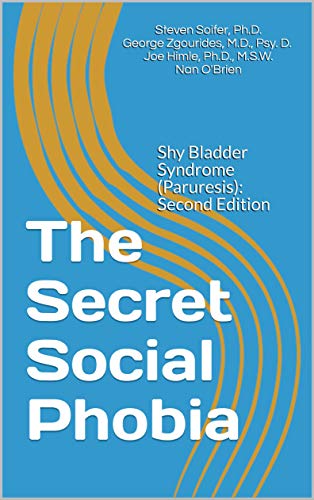by Christopher J. McCullough, Ph.D – Author of Free to Pee
(This book is available from The IPA Store)
A woman called me many years ago and said she had not left her home in 20 years. I told her that was interesting but why was she calling me? “Well,” she said, “I want to go out.” “Oh, I see. Then perhaps I can help.” The point is, the criteria for determining whether one suffers from some problem comes from the individual experiencing it, not from outside sources such as psychological diagnosis or therapists, friends, or family’s opinion.
For example, there are people who cannot urinate at a urinal under any circumstances but can do so using the stall. They do not consider this a problem. Another person with the exact same situation considers it a severe disability and feels that his whole life is devalued by it.
Thus there is this relationship between the objective facts, i.e., the degree of freedom in urinating environments, and the attitude one has toward it–what I call “Secondary Paruresis.” Further, not only does attitude play a role in defining whether or not one suffers from a disability, it also reveals that attitude is not inherent in the behavior but is assigned by the individual involved. It may not seem so because the meaning assigned to the behavior may be many years old. It may seem unquestionably this or that. Nevertheless, since the inability to urinate in the presence or anticipated presence of others means different things to different people, it is not possible to claim that it has any meaning in itself.
People talk about whether psychotherapy is helpful or necessary in addressing the problem of paruresis; I, for one, have found that paruresis is a much more psychologically complex issue than one may at first think. Moreover, I believe that treating paruresis as a problem rather than a symptom of a problem limits recovery potential. I have two clients who describe themselves as recovered who did little to no behavioral desensitization or other symptomatic treatments (e.g., medication). The work they did in therapy focused on self-esteem and confidence and included an emphasis on developing assertive communication.
In the many phobias I’ve worked with over the years, including fear of birds, snakes, bridges, clowns, telephones, and burning buildings, one element seems present in all of them: a feeling that the phobia-inducing object or situation has more power than that of the phobic. By either reducing the power of the object/situation OR by increasing the power the client feels he or she possesses, the phobia is eliminated or reduced. In regard to paruresis I believe that there is also a power/powerlessness relationship at the urinal; thus the psychotherapeutic focus in my work with clients with paruresis is to build or rebuild a sense of power in their interaction with others. This is something that can be addressed in one’s general life, i.e., non-paruretic situations, which then, indirectly, improves the ability to urinate in public.
As a footnote, I do not use the term “paruretic” to describe a person with paruresis. Although there may be some initial relief in discovering that a problem has a name and that others experience the same thing, beyond that it seems to me it can suggest that one’s being is defined by the term. “I’m a paruretic,” seems both undeserved and untrue. I don’t know how much time you spend peeing (or not peeing), but the actual time involved is pretty small compared with everything else you do and everything else you are. I know it is more convenient to say paruretic than a person with paruresis, but I think the distinction is important. In general I believe that descriptions of experience are less restrictive than labels. Labels offer a way of identifying an experience but can also create limits that in turn imprison.
What is Paruresis?
When any term is used in an attempt to describe human experience, it assumes some universal element or essence that exists in every instance in which the term applies. Yet, as with all labels, the universal essence of paruresis is elusive. For example, paruresis is considered by many to be a “social anxiety” or “social phobia.” However, many who experience difficulty urinating in the presence of others are not anxious at all. Also, it seems clear that for many there is a varying degree of fear of negative evaluation from others (another characteristic of social anxiety) who may notice they are not urinating. Some, perhaps fewer in number, report they have no such concern. Some see a historical connection between childhood teasing and adult paruresis; some don’t. Some see a connection between paruresis and penis issues, e.g. size, circumcised, uncircumcised. Then there is the fear of being thought homosexual or a fear of one’s own homosexual feelings.
The universal cause of paruresis is unclear, and perhaps that is simply because it can have many causes and contributing factors. This implies, of course, that no one treatment is effective for everyone. In spite of the fact that we all like a clearly defined problem with clearly defined solutions, the reality is that human experience does not conform to scientific principles. Each of us, at best, is an eccentric, a mysterious and complex and unique set of biological, psychological, social, environmental, and historical experiences. One can never understand a “paruretic,” only a unique individual who has difficulty urinating in certain circumstances. Beyond that definition lies the individual self that deserves individual respect and care.
I have seen in some of my clients that paruresis is an opportunity to address issues that greatly enhance the quality of their life. Working on paruresis is often difficult, boring, and disruptive–all of which seems unfair just to be able to pee! After all, one shouldn’t have to be bothering with something like this. Resentment is understandable. Paruresis seen as a symptom, however, holds the promise that by addressing the issues that underlie it, quality of life as a whole can be greatly enhanced. Using paruresis as a vehicle for growth is much more palatable than the sterile efforts necessary just to be able to pee and nothing more.
Self-consciousness and Self-containment
At this point in my experience, I think that inappropriate or dysfunctional self-consciousness is the common factor running through all variations of the problem. One may stumble as he/she walks by a group of people who seem to be staring at them. In this sense, paruresis is like “tripping.” Some people can’t have sex in front of their pet. It is not a particularly brilliant insight that self-consciousness is involved in paruresis, but rather than trying not to be self-conscious, e.g., using multiplication tables, relaxation, and other such techniques, I’m interested in exploring how one can, at will, achieve a sense of “self-containment.” I recall a sports announcer describing Tiger Woods as a “cocoon of concentration.” A client once said that he experiences this most when he is flying an airplane.
Something happens at the urinal that seems to rob one of this safe containment. It could even be a boundary issue, a feeling of one’s space being invaded. Even without the collateral issues of fear of criticism or anxiety, the mere presence of someone can cause a paralyzing self-consciousness.
Psychologist Fritz Perls said that the cure for public speaking was to “take back your own eyes.” Anxious speakers go outside themselves and try to see themselves from the audience’s point of view. In that process they abandon themselves and become objects. The remedy is to stay “home” and focus on the audience so intently that you lose a sense of yourself, hence taking back your own eyes. An interviewer asked a baseball player how he could concentrate with all the noise from the crowd. He said, “What noise?” A client told me that Jack Nicklaus had the ability to connect with the crowd and then turn totally inward and focus on his next shot.
When we become self-conscious we become an “object.” When we are “at home” with ourselves we remain a subject that looks outward. The challenge is to remain a subject when in the actual presence of others. When someone looks at us we are an object to them. Sartre talks about this as the “gaze.” To not allow the gaze of another to turn you into an object requires that you hold on to your subjectivity, i.e., keep the direction of consciousness from self to world rather than the reverse.
This idea has important implications for the treatment for paruresis. Simply put, the ability to establish a sense of self-containment in any situation would eliminate an essential cause of freezing in paruretic situations. Obliviousness to the external world eliminates the possibility of self-consciousness. One of the good things about this insight is that the ability to achieve self-containment can be practiced anywhere, anytime, unlike the awkward and time-consuming efforts in desensitizing to public restrooms. You might first make a list of situations in your everyday life that could be used to practice this skill.
Sketch of Factors that Contribute to Paruresis
- Underlying psychological causes
- Childhood traumas (bullied, penis insecurities)
- Generalized feelings of inadequacy
- Critical parents
- The importance one assigns to paruresis (Secondary Paruresis)
- Environmental factors
- Proximity to others
- Noise
- Relationship to others (friend, boss, stranger)
- Characteristics of others (age, body size, penis size)
- Personality characteristics
- Non-assertive
- Sensitive to what others think
- Fear of being seen as inadequate
- Mood or attitude at the moment
- Optimistic/pessimistic
- General feeling of self-worth
- Sexual “contamination”
- A homosexual who does not compartmentalize urination function from sexual function
- A heterosexual or bisexual who is concerned that others may see their inability to urinate as evidence of homosexuality
- Physical factors
- Narrow urethra
- Enlarged prostate
Resistance to Recovery
Anyone with paruresis wants to be over it, but there are factors in play that also resist recovery. One reason is familiarity, a sense that this is who one is. Recovery from even something as negative as paruresis could leave one feeling a sense of an unfamiliar self. “I know myself as a paruretic; to lose that feels like losing a part of me,” one might express it. The need for security by not changing is very human; we tend to hang onto what feels familiar.
In this sense it is good to be aware of the battle with oneself as well as with paruresis per se. For example, it is not unusual for a chronically anxious client to report how anxious he or she became when experiencing a moment of relaxation.
A second source of resistance to recovery is that the disability may have led to an association with others with the same problem which one wishes to maintain. Sharing a common problem is satisfying and creates a feeling of belonging. To recover is to lose membership in the group.
Also, there can be a feeling of guilt in recovery. For example, two overweight friends may fear that if either loses weight the other will feel rejected or abandoned. In order to avoid the guilt they maintain their obesity. Getting better while others don’t may result in “survivor’s guilt.”
- There can also be many other more sophisticated resistance factors, such as unresolved family issues. The important point is that if you aren’t aware of the part of you that resists recovery, your progress will be more difficult.
Random Thought:
If peeing did not involve one’s genitals, would anyone suffer with paruresis? If one urinated from the left index finger (point and shoot), would we have the IPA? Of course, if urinating employed the middle finger it would create a whole new meaning for “giving someone the finger.”
Just a thought….



